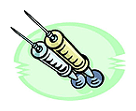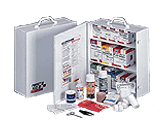Links to Remember
Basic Health and Safety
In this section, you will find information on how to stay well while in Guatemala and while traveling to other countries. The process of wellness starts before you go abroad with a visit to your doctor. You may need to get inoculations to protect you from various illnesses before traveling. You will also learn some tips about food and water safety.
1. General Travel Safety
Planning for a Healthy and Safe Time Abroad: Learn all you can about the health and safety issues of all the countries where you plan to study and travel. This includes reading about the cultural and political climate of those countries, as well as learning about how others view people from your country, race, ethnic group, religion, gender and sexual orientation.
2. Travel Safety in Guatemala
Planning for a Healthy and Safe Time in Guatemala: Preparation for your time in Guatemala should include an understanding of the current political, cultural and religious events of the country as well as the region, and an awareness of the social climate. Students are advised to be alert to their surroundings, and be particularly aware of any health and safety advisories for the areas in which they will be studying.
Getting a Balanced Perspective on Health and Safety in Guatemala: In order to gain a more objective perspective on how safe travel to in Guatemala is, view the health and safety reports on in Guatemala from a variety of sources. We have provided a table below with links (on the left) to the Australian, Canadian and British governments' country advisories on in Guatemala. On the right side of the table are links to those same governments' perspectives on safety in the United States, which you can use to compare health and safety issues in Guatemala and the United States.
3. Important Health and Safety Issues
Visit this page to see the top ten health and safety issues you should be aware of before you depart for in Guatemala and the other countries to which you may be traveling.
 Illnesses, Diseases, and Inoculations: Find out about the various illnesses that might be more common in Guatemala or the regions and countries to which you will be traveling. Get the appropriate shots and pills, and take the appropriate medications with you if your doctor thinks it's necessary. Find out about any potential side–effects of shots and pills that you may take. For information on illnesses that may be prevalent in Guatemala, please see the CDC link in the Resources section of this Handbook.
Illnesses, Diseases, and Inoculations: Find out about the various illnesses that might be more common in Guatemala or the regions and countries to which you will be traveling. Get the appropriate shots and pills, and take the appropriate medications with you if your doctor thinks it's necessary. Find out about any potential side–effects of shots and pills that you may take. For information on illnesses that may be prevalent in Guatemala, please see the CDC link in the Resources section of this Handbook.- Physicals and Check–ups: Get a complete physical, eye exam and dental check–up before going to in Guatemala. While health care is generally good in Guatemala, the quality of dental and medical care might be different in the various countries or regions you may visit. Also, they could possibly be more expensive than similar care in the United States.
 Can You Drink the Water?: Find out if water is generally safe to drink in different regions of in Guatemala and in the countries to which you will be traveling. To avoid diarrhea and other bacteria, purify questionable water before you drink it. Make sure water bottles come sealed when you buy them. Remember that ice can also be unsafe, as well as the water you use to brush your teeth.
Can You Drink the Water?: Find out if water is generally safe to drink in different regions of in Guatemala and in the countries to which you will be traveling. To avoid diarrhea and other bacteria, purify questionable water before you drink it. Make sure water bottles come sealed when you buy them. Remember that ice can also be unsafe, as well as the water you use to brush your teeth.- Food Safety: If you get diarrhea or food poisoning, remember to drink plenty of fluids to stay hydrated. As with any illness, consider seeing a doctor if your condition worsens. Give your body time to adjust to new types of foods you will be eating.
- Laws and Codes of Conduct: Make yourself aware of both the rules and regulations of your study abroad program sponsor, and the local laws and customs of in Guatemala and the countries which you will be visiting. Understand that you will not only have to conform to the legal system of in Guatemala, but also obey the codes of conduct required of program participants. Also recognize that certain laws may vary from region to region or even city to city.
 Mental and Physical Health: Consider your own mental and physical health issues when applying for a study abroad program, and make all your necessary health information available to your program's administrators in the U.S. and abroad so they can assist you with any special needs, or advise you on the risks you might face. Study abroad may include both physical and mental challenges for students, so make sure you establish a support network of program administrators, family and friends who can help you. According to the U.S. Department of State, "Good medical care is widely available."
Mental and Physical Health: Consider your own mental and physical health issues when applying for a study abroad program, and make all your necessary health information available to your program's administrators in the U.S. and abroad so they can assist you with any special needs, or advise you on the risks you might face. Study abroad may include both physical and mental challenges for students, so make sure you establish a support network of program administrators, family and friends who can help you. According to the U.S. Department of State, "Good medical care is widely available." Prescriptions: To be cautious, get a doctor's signed prescription for any medication you have to bring with you to in Guatemala, and get it translated into in Guatemala. However, if you can, take a supply large enough to cover your stay while abroad, just in case you can't fill your prescription while abroad. Contact the U.S. Embassy in Guatemala or your program administrator/advisor to find out if and how much U.S. prescription medication is allowed into in Guatemala. Also include a copy of your prescription for your glasses or contact lenses. Bring an extra pair of glasses.
Prescriptions: To be cautious, get a doctor's signed prescription for any medication you have to bring with you to in Guatemala, and get it translated into in Guatemala. However, if you can, take a supply large enough to cover your stay while abroad, just in case you can't fill your prescription while abroad. Contact the U.S. Embassy in Guatemala or your program administrator/advisor to find out if and how much U.S. prescription medication is allowed into in Guatemala. Also include a copy of your prescription for your glasses or contact lenses. Bring an extra pair of glasses.- First–Aid Kit: Consider a well–stocked first–aid kit as a first line of defense. Some items to include are: sunscreen, bandages, flashlight, sterile pads, insect repellent, adhesive tape, aspirin, antacid, anti–diarrhea tablets, anti–malarial medication, extra bottled water, feminine protection, condoms, rubber gloves, etc.
 Fitness and Exercise: Try to get fit in the time you have before departing for in Guatemala. A healthy body can help you fight off illness and recover faster if you do get sick. Even though it may be harder to follow a structured workout routine, try to stay fit while in Guatemala. Exercise also helps to increase energy levels and combat depression. Get a good pair of comfortable walking shoes. Without access to a car or public transportation in Guatemala, you may have to do quite a bit of walking. Break in your shoes before you go.
Fitness and Exercise: Try to get fit in the time you have before departing for in Guatemala. A healthy body can help you fight off illness and recover faster if you do get sick. Even though it may be harder to follow a structured workout routine, try to stay fit while in Guatemala. Exercise also helps to increase energy levels and combat depression. Get a good pair of comfortable walking shoes. Without access to a car or public transportation in Guatemala, you may have to do quite a bit of walking. Break in your shoes before you go.- Emergency Contacts: Keep your program staff and your emergency contacts at home and in Guatemala well informed of your whereabouts and activities, and provide these people with copies of your important travel documents (i.e. passport, visa, plane tickets, traveler's checks, and prescriptions, etc.).
- Air Travel: When you travel by air, drink a lot of non–alcoholic fluids, stay away from caffeine, eat light, and stretch often to avoid jetlag. Many airlines are now required to show an in–flight video of stretching exercises you can do on the plane in order to avoid the potential formation of blood clots, which can be caused by cabin pressure. A direct flight is usually easier for most travelers, but flights broken up by stops can also lessen jet lag.
- Transportation: Accidents involving in–country travel, whether by air, bus, train, taxi, car, etc., are a major cause of injury to students abroad. It is important to understand what the safe modes of travel are in Guatemala and in the countries to which you plan to travel. For more information on transportation in Guatemala, please visit the U.S. Department of State.
- Bus: Guatemala City and many other major towns have limited, but cheap, bus services. Buses usually run to all of the main tourist attractions and can be a great way to experience the ‘real’ town. The network of regular bus services serving journeys between major towns may be cheap, but they are often over-crowded. There are more expensive services available which tend to have air-conditioning and be safer. In general, more buses leave in the morning than the afternoon. Bus traffic drops off around 4pm; night buses are rare and not generally recommended. For a few of the better services you can buy tickets in advance, and this is generally worth doing as it ensures that you get a place Buses are not a very safe way of traveling in Guatemala. A few times a month, a bus plunges over a cliff or rounds a blind bend into a head-on collision. Armed robbers also often hold up buses and take the money and valuables of the passengers. If this happens to you, cooperate and do not try to resist or get away as this can be extremely dangerous.
- Train/Metro: Ferrovias Guatemala is the 500 mile railroad that connects Guatemala City to Mexico, El Salvador and a number of cities on the Atlantic and Pacific coasts. Services are fairly reliable although journeys can be long and often arduous. Comfort on the trains depends on what class you are traveling.
- Air: Air travel is the most efficient way to travel in Guatemala, and generally the safest as well. Guatemala City International Airport is one of the major gateways into the country. It is also the most convenient and often is the quickest way to travel. The country’s national airline is TACA, although a number of other airlines serve the airport. These include: American Airlines, British Airways, Continental Airlines, Iberia and United Airlines. Guatemala City International Airport (GUA), the largest and busiest airport, is less than 4 miles south of the city. The airport is fully equipped for passengers who are travelling with disabilities. The entire airport is wheelchair accessible and there are adapted toilets, telephones and braille signs. A bus runs from the airport into the city centre and taxis are available with travel time into Guatemala City being approximately 20 minutes. Flores International Airport (FRS) is located in the suburb of Santa Elena, Flores. Regular flights operate to and from national destinations as well as limited international destinations such Belize. Facilities are somewhat limited compared with Guatemala City’s airport, but are still adequate. Bus service into the center of town is available, or you can hire a car or one of the taxis waiting outside of Arrivals.
- Car: In order to rent a car or motorcycle a passport, driver’s license and a major credit card are all required. Usually, the person renting the vehicle must be at least 25 years old. Insurance policies accompanying rental cars may not protect you from loss or theft, in which case you could be liable for any damages. Driving in Guatemala can be much different than driving in your native country. Drivers pass on blind curves, always give the right of way to vehicles coming uphill on narrow passes and honk liberally. Additionally, there are few road signs and no indication from other drivers of what they are about to do. Driving at night is not suggested due to an increased risk of encountering armed bandits, dangerous drivers and low visibility. Be aware that when an accident occurs that results in injury or death, every driver is taken into custody until a judge determines who was responsible.
- Boat: The country’s main ports are Santo Thomás de Castilla, Puerto Quetzal, San José, Puerto Barrios and Champerico. You will also find numerous marinas on the Rio Dulce. There are several international passenger services and cruises commonly stop at the various ports.
- Bicycle: You can find places to rent bicycles in larger towns. Ask the locals for information. Be sure to exercise caution and be aware of drivers.
For more health and safety information about driving abroad, the Association for Safe International Road Travel offers road travel reports, seasonal hazards, safety tips and common driver behaviors for travel abroad.
- Alcohol and Drugs: Use and abuse of alcohol and drugs abroad can increase the risk of accident and injury. Many study abroad accidents and injuries are related to the use and abuse of alcohol and drugs abroad. Violating drug laws in Guatemala may result in very serious consequences. In some countries you may visit, being found guilty of violating drug laws can result in consequences as serious as death.
- Setting an Example: Set a good example. Remember you are like an ambassador for your U.S. college or university, as well as your culture and country. Behave in a way that is respectful of others' rights and well–being and encourage others to do the same.
4. Relevant Questions
- Who among the program staff should be informed of your travel plans, or who can serve as an emergency contact for your family back home?
- Who are your emergency contacts in the United States? Do they have copies of your important documents? Can they make decisions on your behalf if you are unable to do so yourself (do they have power of attorney)?
- What health recommendations has the Center for Disease Control and Prevention (CDC) recently made for the country of your choice and the countries to which you will be traveling?
- Do you have any dietary restrictions? If so, do they pose a problem while in the country of your choice?
- How much walking will you be doing in the country of your choice? How can you prepare yourself for higher levels of physical activity?
- What should you carry in a first aid kit?
- What are the general sanitary conditions in the country of your choice? What kinds of precautions are necessary when drinking water or eating local food?
- Are there any specific immunizations you must get before entering the country of your choice and the countries to which you will travel?
- If you have any pre–existing health conditions, or you need to carry special medications abroad, what should you do before you go abroad?
- With whom can you leave copies of your important health–related documents?
- Will your prescription drug(s) be legal and/or available in the country of your choice?
- What is the generic name, and a citizen of the country of your choice for your medication?
- Does the staff speak English, a citizen of the country of your choice, and other indigenous languages fluently to communicate the nature of any medical conditions? (Remember, many indigenous groups in the country of your choice might not speak a citizen of the country of your choice or English.)
- Can your program provide for any special needs you may have (wheelchair ramps, un–timed tests, etc.)?
- Do you have access to adequate medical facilities?
- What is the cost of typical medical services?
- What specific travel advisories has the U.S. Department of State recently issued for the country of your choice and the other countries to which you will be traveling?
- What types of crimes are common in the area/city where you will be studying and living?
- What activities increase the risk of accidents and injury abroad?
- How extensive, safe, and reliable is the public transportation system in the country of your choice and the others countries to which you will be traveling?
5. Checklist
- Before leaving, I have gotten a complete physical from my doctor.
- I have received all necessary immunizations required/recommended for entry to the countries I will visit, and I know where to obtain other inoculations abroad if needed later.
- I know who the emergency contact will be at the U.S. and in the country of your choice.
- I know who my emergency contact will be at home.
- I have asked whether or not the drinking water is safe to drink in the country of your choice.
- I know what precautions to take when eating local food.
- I have researched where to buy food that suits my dietary needs/restrictions (i.e. for vegetarians, diabetics, etc...).
- I know how extensive, safe and reliable the public transportation system is in the country of your choice.
- I am aware of the laws and codes of conduct that are likely to impact me.
- I understand that the use of alcohol and drugs increases my risk of accident and injury.
6. Resources
- AllAbroad.us – Health Mentors address any health concerns that students may have while overseas.
- CDC Traveler's Health Centers for Disease Control and Prevention
- Environmental Health Advice on how to deal with environmental hazards ranging from hurricanes to air pollution.
- Health Topics A–Z A continually updated list of disease and health topics.
- Regional Health Advisories A list by destination of the epidemics, diseases, and common infections.
- GlobalScholar.us: Go to Course 1, Module 9, Task 7 "Drug Issues Abroad" about researching drug issues in the country and to take into consideration your own prescription medications.
- Inter–Organizational Task Force: Guidelines for Responsible Study Abroad – Good Practices for Health and Safety Good Practices for Health and Safety – A task force of study abroad administrators developed a set of guidelines, which include fifteen points of responsibilities for program administrators.
- Language and Liability: The Linguistic Dimension of Health and Safety Abroad SAFETI On–line Newsletter article by Rodney Sangster, Regional Director of the University of California Education Abroad Program.
- National Mental Health Association: College Student and Depression Fact Sheets This site provides a brief background on issues related to college student mental health issues.
- Predeparture Health Training Handbook Introduction to safety concerns to think about before departing.
- Sara's Wish This site provides helpful safety tips on things to remember when traveling abroad.
- Screening for Mental Health, Inc. Provides resources for nationwide mental health screening programs and to support cooperation, professionalism, and accountability in mental illness screenings.
- Sexual Harassment and Prevention in College Students Studying Abroad SAFETI On–line Newsletter article by Nancy Newport, Licensed Professional Counselor and Consultant to the Peace Corps.
- StudyAbroad.com Handbook: Immunizations Brief notes on the need for immunizations prior to traveling.
- StudyAbroad.com Handbook: Prescriptions Summary recommendations for dealing with prescription medications abroad.
- Travel Clinic Information on travel related health matters.
- Treatment of Sexual Assault in College Students Studying Abroad SAFETI On–line Newsletter article by Nancy Newport, Licensed Professional Counselor and Consultant to the Peace Corps.
- U.S. State Department Bureau of Consular Affairs: Travel Warning on Drugs Abroad Details the penalties for drug possession and what the U.S. consular officers can and cannot do for you in the event you are arrested.
- U.S. Centers for Disease control and Prevention Information SAFETI Online Newsletter article offering travel health resources for students studying abroad.
- US Department of Health and Human Services: Disaster Mental Health This site provides information about US Government resources to support mental health for those who have been affected by a disaster.
- U.S. Department of State: Road Safety Overseas Lists some links travelers should visit before attempting to drive overseas.
- U.S. Department of State: Studying Abroad Advice to students on how to prepare for a safe experience abroad, and descriptions of services the U.S. Department of State can provide.
- World Health Organization International Travel and Health information, including vaccination Requirements and Health Advice.




 Guatemala
Guatemala





